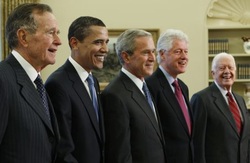
The dialogue has its context. Voters have a distinct perception of the most important issue, how well or how poorly the economy is doing. And they hear reports of how wars are going.
This perception is how Ronald Reagan used the phrase “Morning in America” in his re-election campaign of 1984. As the public already believed, rightly or wrongly, that the nation had peace and prosperity, Reagan’s dialogue was strengthened.
As a way of telling the public not to argue with success, he said of his opponent, Walter Mondale, that he “never met a tax he didn’t hike” and that he “taxes [Reagan’s] patience.” Mondale’s response, that he was being “honest” about the need for new taxes, got lost in the dialogue. Given the choice of a candidate who promised jobs and a candidate who promised the truth, voters as a group were conditioned to optimism and believed they could have both.
A dialogue over taxes took over the following election between Vice President George H. W. Bush and Massachusetts Governor Michael Dukakis. Bush lacked his predecessor’s congenial manner and used issues in a more cynical way.
Bush’s dialogue included phrases such as “read my lips, no new taxes” and a name for his opponent’s state, “Taxachusetts.” But on the issue of crime, he repeatedly named a man who had been released as part of the Massachusetts furlough program and who had then raped a woman. Television commercials made it clear that the prisoner, Willie Horton, was a black man.
It was as if Bush was saying that the voters ought to fear a Dukakis election as crime and taxes would go up. He also threw in Dukakis’ veto of a bill that would have made a teacher’s refusal to lead the pledge of allegiance a crime. It was an assault on Dukakis for some of his ideas of public safety, taxes and patriotism.
Dukakis responded by explaining that a predecessor had started the furlough program and that he (Dukakis) had ended it after the Horton incident. He attacked Bush for promising not to raise taxes (a pledge that came back to haunt Bush albeit too late to help Dukakis). And he made it clear that he had gotten an advisory opinion about the bill on the pledge of allegiance from his state’s highest court, which told him it was unconstitutional.
The dialogue had Dukakis on the defensive even before he answered. Bush picked issues that evoke a visceral response but would not have gotten away with selecting these issues had the economy not be understood by the public to be satisfactory. Bush could not get re-elected because the economy had worsened over the next four years and because he had to defend his own record.
So what is in store for the election of 2012?
The economy has gone from bad in 2008 to…bad in 2012. President Obama will talk about his health care legislation and how the Supreme Court found it to be constitutional.
Mitt Romney will have to find a new way to attack a law patterned to a good extent after a law he signed when governor of Massachusetts. He will also have to explain what he would do differently than Obama in turning around the economy.
The burden is on Romney to find a chord that even some Democrats can agree with. Obama has positioned himself as a somebody. It will take a somebody to beat one.
 RSS Feed
RSS Feed
